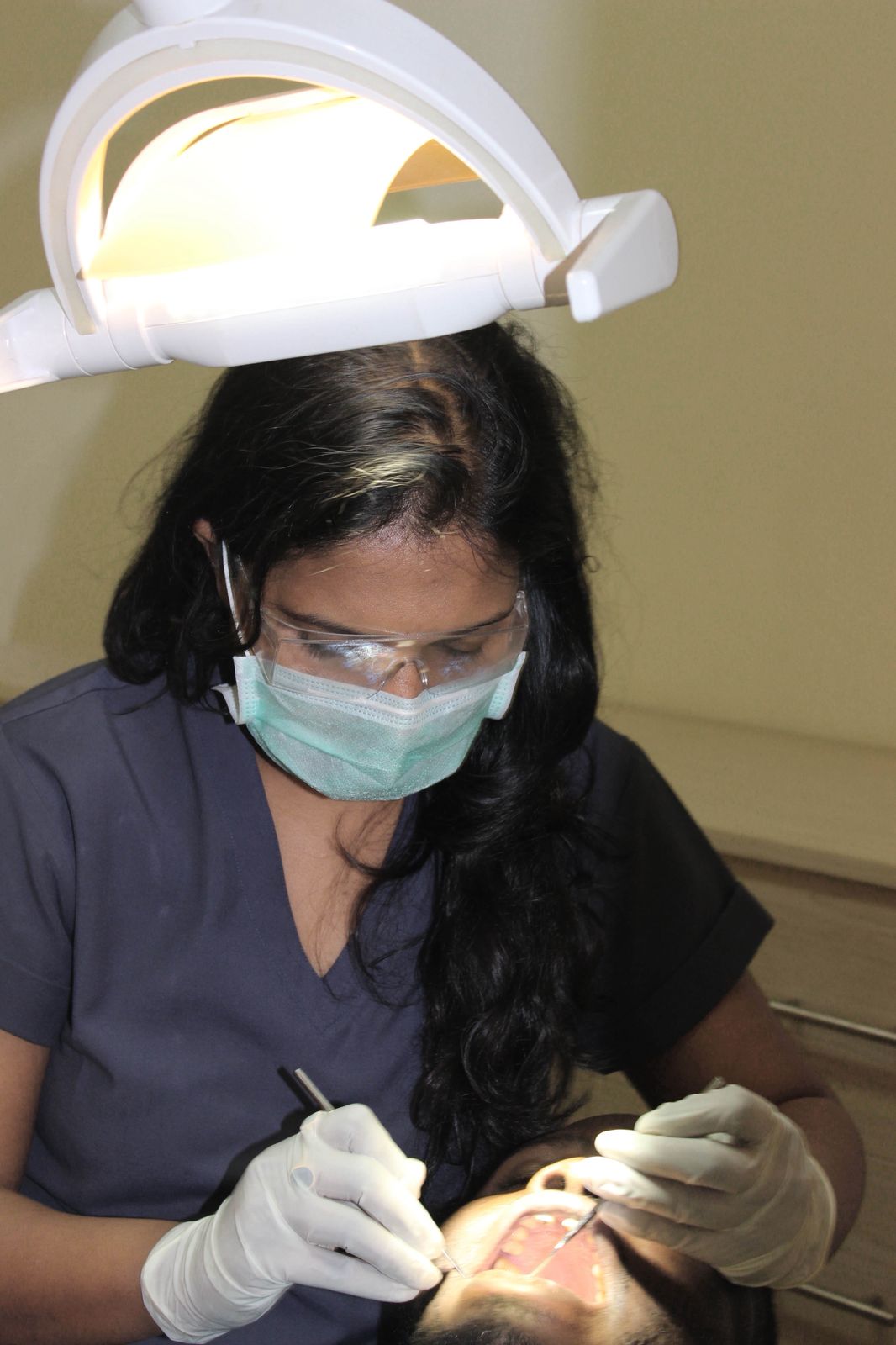
Dr Kaveri performing a dental procedure on a patient.
Have you ever found yourself in a situation where you fear opening your mouth to speak?
Or you find yourself in a room where you don’t want to spend a second more because of the unwelcoming odor.
Well, worry less, Dr.
Kaveri Bilgi, consultant dental specialist at Meditest Diagnostics located at Park
Medical Centre, is here to provide a solution. She explains the causes, the
treatment and the best oral hygiene practices that could help eliminate the
problem permanently.
She begins by explaining what bad breath or halitosis really
is. She says that it is an unpleasant odor emanating from the oral cavity. She
says that it is not a disease but a symptom caused by other dental problems
like dental cavities, gum diseases or some other underlying systemic diseases
like diabetes.
According to Dr Kaveri, “bad breath is a common problem occasionally
experienced by many individuals every morning. It is caused due to buildup of
bacteria in the mouth. The causes of halitosis are poor oral hygiene, which
results into dental cavities, gum diseases, coated tongue. It is caused by some
foods, smoking and alcoholism. Some oral infections like abscess, patches or
cancer. Some other health issues like flu, sinusitis and tonsil can also cause
bad breath. Diabetic people have bad breath and also people with impaired digestive
systems can have bad breath.”
She says that there are two broad types of halitosis. They include physiological halitosis which happens to almost every person after being
awake from sleep. This mainly happens because there is no activity for the oral
cavity during sleep. The second type of halitosis is pathological halitosis, which is mainly caused by many diseases in the oral cavity like dental
cavities, gum diseases like gingivitis and periodontitis, coated tongue, oral
lesions like ulcers, tumours, abscess and any cancer and dry mouth.
“Chronic bad breath can sometime be a signal to more
underlying serious systemic issues. These include; sinus infections,
respiratory tract infections, digestive disorders mainly Gerd (Gastroesophageal
disorder) Gastritis due to acidity or ulcers, diabetes, liver disorders, kidney
disorders,” said Dr Kaveri.
“Gum diseases are usually caused by poor oral hygiene. The
gums are swollen and detached from the teeth surface which results into deep
pockets where the food accumulates and harbours
bacteria leading to bad breath. The excessive gum diseases cause periodontists.
Dental cavities are usually caused by carries and are safe areas for food lodging and thus bacteria collections causing bad breath.”
She explains on the importance of maintaining a lubricated mouth. She says: “Dry mouth is a significant factor in bad breath. Saliva plays a big
role in neutralising the pH of the oral cavity. It neutralizes the acids in the
mouth controlling the growth of bacteria. When the mouth is dry, the bacteria
develop more leading to bad breath. The most common causes of dry mouth include,
dehydration that is less intake of water medications like Benadryl, Benzodiazepines,
anti-depressants, opioids; Mouth breathing and medical conditions.”
The most common foods that cause bad breath are garlic, onions,
spicy foods, certain cheese and coffee. Some of them are rich in Sulphur. Some of
these foods leave residues that bacteria feed on or get absorbed into the blood
stream and released via the lungs.
After explaining on the causes and effects, Dr Kaveri took a
deep dive to explain on the possible remedies to the situation which she insists
can be permanently managed if the necessary steps are followed.
She says: “Brushing twice daily with a right technique, tongue cleaning with tongue cleaners. The tooth brushes wear away and one needs to change the brushes every three months. Hydrating well, drinking water at regular intervals and avoiding liquids with sugar and carbonated drinks."
She adds: "Keeping
dental prosthesis clean. Using antibacterial mouth washes and the best alternative
is using warm salt water gargles at least twice a day. Keeping a check
at your overall health. Regular dental visits. The most recommended is once
every six months. Adhering to these practices will help cure even the most
severe halitosis.”
Dr Kaveri advices at least two dental
visits in a year. She further recommends anyone who has had bad breath due to
dental cavities, broken teeth and painful teeth, to visit a dentist at time of
need. She says that regular dental check
ups will make it possible for doctors to detect any underlying teeth problems
at an earlier stage hence manage it before it gets out hand.










